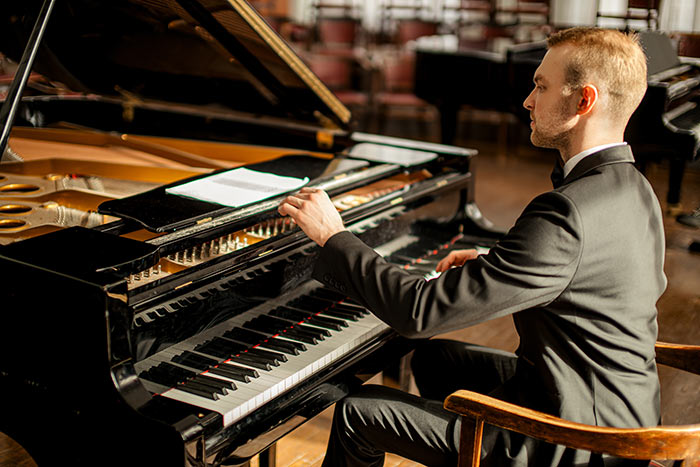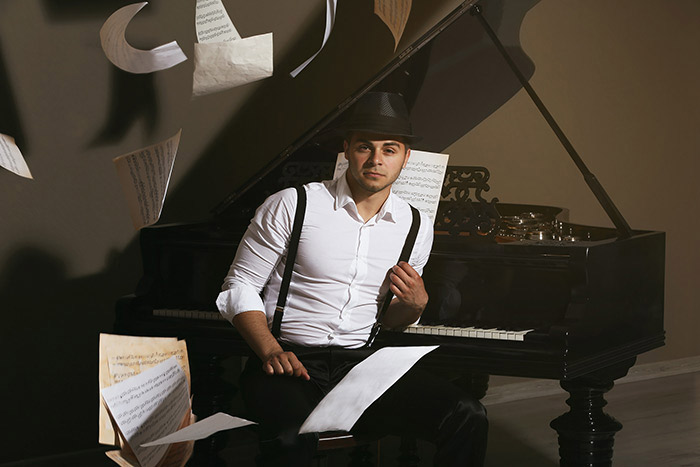Piano recitals are both thrilling and exhilarating as they are daunting.
When you’re called to the stage all that matters is how well you’re about to perform.
I remember each and every one of my piano recitals.
My stomach would start to twirl moments before – no matter the size of the audience – and my mind would be clouded with anxiety and doubt.
Friends, family and my fellow peers would all ask me the same thing as I nervously sink down in my seat in the waiting room: are you ready?
If you find yourself struggling to answer this question truthfully before a performance, this article is for you!
Use it as a clear guide with five signs to help you decide whether you will answer the question with a yes or no.
1: You Can Play with Musicality – Not Just Accuracy
There is a significant difference between being able to play accurately, and playing with musicality and expression.
My piano teacher always used to drill this principle into me.
Playing accurately is with no doubt an achievement, since it is the goal in the end.
But it is void of emotion, colour and life. It lacks personal touch, making it dispassionate, robotic and stiff.
Playing with expression does not only enhance the authenticity of your performance, but it hooks the audience to your every note.
SHS Web of Conferences1 analysed the importance of musical expression, stating:
“The research shows that the systematic cultivation of musical expression can not only help students better understand music works, but also effectively promote the improvement of their comprehensive artistic quality and lay a solid foundation for their future musical road.”
The paper concluded that not only is musical expression essential in playing the piano, but it is the fundamental element to piano performance.
You’ll know you’re ready when you play your piano piece(s) with both accuracy and musicality.
Don’t just play the piano, make it sing!
2: You Can Play from Memory (or With the Score Comfortably)
Being able to play a piece comfortably and knowing you can, is an extreme confidence boost.
Piano recitals are stressful enough on their own and you need to be confident in yourself and your ability to perform well.
Anxiety and stress isn’t going to get you anywhere.
Playing from memory or strong familiarity gives you the freedom to focus on expression – an essential part of music as mentioned previously.
It doesn’t take great skill to notice someone is nervous.
A listener can almost immediately tell if you’re lacking confidence.
The very manner in which you walk on to the stage until being seated behind the piano sends a message to those sitting in the audience.
You want a glowing aura of confidence, because even the simple act of feeling self-assured will make it easier and much more enjoyable to play your recital.
Yet, it beckons the question: how do I boost my confidence?
Become so familiar with your pieces that you can even play them with your eyes closed!
Have you ever wondered why professional pianists often play live performances without sheet music?
It’s due to a combination of a deeper desire to play more expressively, tradition and even the distractions of page turns.
Professional pianists know their pieces so well that they naturally remember everything.
Know your music pieces well, and the confidence will come automatically.
3: You’ve Performed in Small Settings Already
Many music institutes run student performance classes before full recitals.
This helps students evaluate their playing and get an idea of how they’ll fare in the actual performance.
If you can manage your stress levels in this setting, you are basically ready for your actual recital.
Even playing in front of friends and family can help you with preparation for the big day.
This is not an essential needed for every performance, but helps immensely.
The last thing you want is to perform your recital, wishing you’ve performed it in front of others first.
4: You Understand the Story Behind Your Piece
Someone once told me that if you cannot explain what your piece communicates, how are you going to communicate what it explains?
If you don’t even know the background or story behind your piano piece, can you really interpret it faithfully?
This concept goes hand in and with musical expression.
Knowing your piece is not just knowing the notes or techniques, but the content and structure as well to turn your performance into a storytelling, which resonates strongly in recital settings.
I encourage you to read the following article should you want to gain a deeper understanding of this concept:
The Importance Of Understanding And Interpreting Piano Music
5: Your Teacher Agrees You’re Ready
A good teacher wants to see you pass with flying colours.
Thus, if your teacher agrees that you’re ready to perform, you probably are – even if you don’t believe it.
You need to trust your teacher’s experience and competence, especially when it comes to this decision.
What if you don’t have a good piano teacher or cannot trust their judgement?
It’s probably time for a new one, because time is gold and money is limited – so why waste it on something that you can change?
Here at London Piano institute, the students never have to worry about the quality of teaching they receive.
Every piano tutor is highly skilled, experienced and competent in their ability to teach piano.
Just take a look at our reviews on google where over a 100 people have shared their experiences, but the rating stays high.
You’ll receive an education that’s both outstanding and enjoyable, because in the end playing piano must still be fun!
Conclusion
No one feels 100% ready.
But if you can check all these 5 boxes, you are more than prepared to perform confidently.
Readiness comes from preparation, confidence, and support.
Next time someone asks you if you’re ready you will be able to answer confidently: as ready as I can be!













